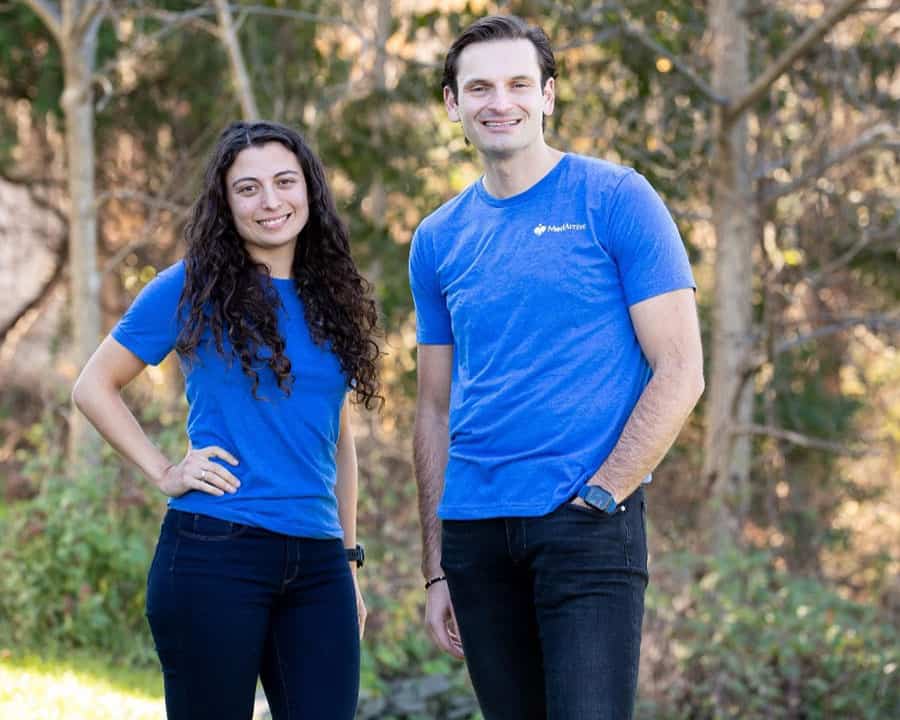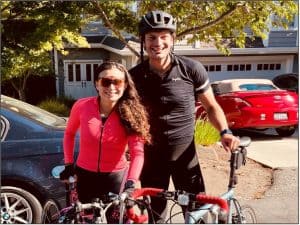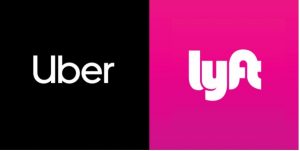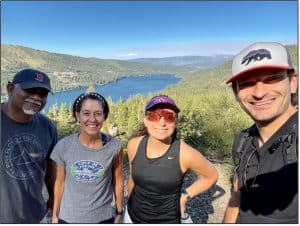Perspectives
7wireVentures Presents: Top of the Ladder Featuring MedArrive Co-Founders Dan Trigub & Inna Plumb

For Co-Founders Dan Trigub, CEO and Inna Plumb, COO, a shared passion for company building and desire to extend care to consumers in the setting they feel the most safe – their home – made the two a perfect match. After identifying the meaningful skillset and opportunity EMS professionals have to treat consumers safely in their homes, Dan and Inna founded MedArrive.
We connected with the duo to learn more about their journey to build MedArrive, how they’ve shaped company culture amidst a global pandemic, and much more.
How did you both meet? What were your first impressions of one another?

Inna: Dan and I met through Redesign Health. I was spending the majority of my time building MedArrive and Dan was someone we identified as a strong CEO candidate. My first impression of Dan was that he was very intense but had tons of positive energy and a really genuine commitment to helping people through healthcare. I would say, both impressions have held true after knowing him better today.
Dan: I was at Uber leading the Uber Health initiative. I was getting tired of the big company machine and working at a place that wasn’t healthcare focused. I wasn’t necessarily looking to leave Uber, but Redesign reached out and I was certainly open to the conversation. After learning more, I was really impressed by Redesign’s model and most importantly, their people. I had the chance to connect with Inna and I was really impressed by her core analytics background and the skill set she has to be a successful co-founder and partner.
It was really Inna who came up with the original business plan for MedArrive, before we even called the business MedArrive (some of the earlier names were ER.Co and Invitation Health- thankfully neither of those stuck!) Her commitment to this idea and the mission was compelling. I always say I couldn’t possibly have picked a better co-founder. I think the stars aligned for sure.
What convinced the two of you that you could build a company together?
Dan: I’m a firm believer that a company is all about the people. Good ideas are a dime a dozen. Even if the idea isn’t perfect, if you have the right people behind it, I’m convinced it can be successful. I view a co-founder akin to the tip of a spear. You need to have a sharp tip, or the spear won’t be that effective. With Inna, it was a no-brainer.
Inna: I also think we really complemented each other’s skillsets quite well which is powerful – especially for the kind of business that we’re building. Dan’s business development background and incredible strategic mind and my analytical and operational background work well together. And like Dan said, we had a great idea, great set of investors, and the start of a really strong team.
Founding a company in COVID where you didn’t meet each other in-person for the first five months, how did you get to know one another beyond a professional setting?

Dan and Inna on one of their first Co-Founder meetings- a bike-ride- during the pandemic
Dan: We spent a lot of time on Zoom calls working through the original business model. From those calls, it was clear that Inna’s professional background, particularly in operations, would be a major asset to our business. We also have very similar personal upbringings with families who immigrated from the former Soviet Union. Inna was born in the former Soviet Union, and I am first generation being the first in my family born in the United States with the rest coming from the former Soviet Union and have had many similar life experiences. I think because of that we understood each other a little better than we would have otherwise.
Inna: It was a funny coincidence; I don’t think we realized we shared that similar background until after a few weeks of working together! We also spoke to each other multiple times a day which really helped us get to know each other better.
Dan: Inna and I have a lot of common interests as well. We both love to bike. Inna does ultramarathons, triathlons, and Ironmans, which I’m nowhere near, but I think we have a lot of similarities that help us work well together. During quarantine, we actually met up for a 40-mile bike ride to spend time together as co-founders!
Inna, you served as a Partner at Redesign Health and were critical in the incubation process of MedArrive before stepping in as Chief Operating Officer. What influenced your decision to select to join MedArrive in particular?
Inna: The first companies that I worked on at Redesign were all healthcare direct to consumer businesses, and while successful, something that always resurfaced were our customers asking if their insurance could cover our services. People in healthcare really expect insurance to cover their healthcare costs, so I was determined that my next company at Redesign would grounded in reimbursement. Specifically, I was working on a few ideas related to bringing care into the home.
However, a lot of the models that existed were very costly and asset heavy. It’s also difficult to convince most clinicians to drive to people’s homes. But when I came across the EMS space, I was astonished by how well-suited EMS professionals are for providing care in the home. Their office is their car and their patients’ homes and as healthcare providers they are underutilized when it comes to chronic condition management.
When the pandemic began in March of 2020, I found myself unable to focus on any other ideas because nothing else felt important enough. Personally, I was concerned about my family and my grandparents and this idea would allow me to directly bring healthcare to them in their homes.
Dan, we recognize you most recently served as Head of Uber Health before stepping in as CEO of MedArrive. What inspired you to join the business? What experiences from your roles at Lyft Health and Uber Health have been most influential when building MedArrive?

Dan: At the end of the day, Uber and Lyft are not healthcare companies. They’re large tech organizations with healthcare divisions. However, at Uber I gained an appreciation for the network effects a platform and a marketplace at scale could have.
I also learned a lot from my father-in-law, who runs a large homecare business here in the Bay Area. Though I never worked for him, I saw his business thrive and the value of delivering care to folks in the home.
From a personal perspective, I come from a first-generation family. My grandmother, who immigrated to this country, never really left her apartment in New York City. She had no transportation and no family or friends outside of us. When we would visit, we would take her places, so I always understood the power of ordering her a ride to get her to a doctor’s office. But now, I saw the power of bringing care to her.
MedArrive connects payers and providers to a network of EMTs, paramedics, and other skilled healthcare workers to extend care into the home. Where do you see the future of home-based care evolving and where does MedArrive fit in?
Inna: I think it’s the opportunity for MedArrive to bring high-quality care to the people who need it most. Over the past six months we’ve leaned into our longitudinal care programs. We’re excited by the enormous opportunity that we have with those programs and with the flexibility of our platform.
Dan: Agreed, I think we have a great foundation. Now, it’s really about execution and focus on scaling. Given we’re not building a direct-to-consumer business, it is not like we can invest in direct-to-consumer marketing and quickly scale. For our business, it’s about expanding with a handful of core partners. It takes time, but we have a great foundation and a great business model.
What are your superpowers?
Inna: Endurance. I feel like my experience doing triathlons and cycling have taught me a lot about treating challenges at work and in life like an ultramarathon rather than a sprint. It’s been a really helpful mindset and has given me so much perspective.
Dan: Responsiveness. I really believe that the little details make the biggest differences. For example, in the NBA, everyone’s a good basketball player. They all have the core fundamentals and are all good athletes, but things like showing up early and leaving late to practice I think make the biggest difference. With being a CEO, I view it as being me versus the leader at the other company that is trying to work with the same partners I am. If I’m faster to respond to emails or more on top of things, I can have an outsized impact.
“With being a CEO, I view it as being me versus the leader at the other company that is trying to work with the same partners I am. If I’m faster to respond to emails or more on top of things, I can have an outsized impact.” Dan Trigub, CEO & Co-Founder of MedArrive
What book are you reading, podcast are you listening to, or show are you watching right now?

Dan: I’m a glutton for documentaries that highlight someone who is the best at what they do. A recent documentary I watched is based on the book I’m reading right now called Beyond Possible: One Man, Fourteen Peaks, and the Mountaineering Achievement of a Lifetime. It’s about a Nepali mountaineer, Nims Purja, who was the first person to summit all 14 of the world’s 8000-meter “Death Zone” peaks. It’s a wonderful book about leadership, what humans are capable of, and doing what most people think is the impossible.
Inna: I just started reading My Brilliant Friend by Elena Ferrante. In terms of podcasts, I’ve been consuming every foreign policy podcast I can find given everything going on in the world right now.
What is one thing you wish you knew before starting a company?

The original MedArrive team on one of their first company outings- a hike!
Dan: MedArrive wasn’t the first company that I started from scratch, so I was able to draw from prior experience. I think the most important thing I’ve learned is to focus on what’s important.
When I first started building companies, I was too focused on developing the brand and marketing, but that doesn’t matter as much, especially for a B2B business. What’s more important is delivering your core service really well, proving people will pay for it, and then scaling from there. Everything else is a distraction until you’ve been able to show that.
Inna: MedArrive is my first time starting from scratch. Understanding how to build traditions early on is important. One thing I respected when Dan joined was that he introduced weekly all-hand meetings. In the beginning, it was a little funny because there were just four of us. But it gave us a nice rhythm and created a core tradition and structure for our team. We’re so much bigger now, over 30 people, but the spirit of the all-hands has stayed the same. It’s really permeated throughout the business and allowed us to build a strong culture even though many of us haven’t met each other in person yet.
What is one piece of advice you would offer to other digital health entrepreneurs?
Dan: I think there are four key things would tell an entrepreneur: 1) People, 2) People, 3) People, and 4) Take care of yourself.
It’s much more important to have the right people around you because no matter the curveballs that are thrown your way you’ll figure it out.
Being in a good mental and physical state is also extremely important. If you don’t take care of yourself, you’re probably going to let your people down. Personally, I used the time during the pandemic as an opportunity to get into the best physical shape I’ve ever been in, and I think it has really made a big impact on my ability to work better and take care of the people around me. Focusing on family is also part of taking care of yourself. Ultimately, there are many more important things in life outside of building a startup. You can’t lose perspective of that.
Inna: I would tell entrepreneurs to build the kind of culture that they want to work in. One of the greatest joys I’ve had at MedArrive is the genuine, transparent, and high integrity culture we’ve built at the company.
Lastly when things get difficult, know that you will be able to get through it. Like I said earlier, it’s an ultramarathon not a sprint.
“When things get difficult, know that you will be able to get through it. Like I said earlier, it’s an ultramarathon not a sprint.” Inna Plumb, COO and Co-Founder, MedArrive.